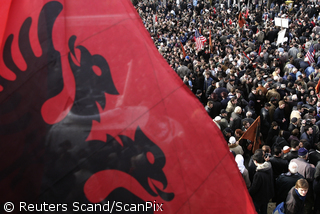OPEC Planning to Maintain Oil Quotas as U.S. Winter Nears
Published:
24 September 2003 y., Wednesday
OPEC, supplier of a third of the world's oil, is planning to maintain output quotas through the end of the year as sabotage limits Iraqi exports and demand rises because of winter from the U.S. to Japan, officials said.
The group meets today in Vienna. Ministers from Saudi Arabia, Iran, Kuwait, the United Arab Emirates, Algeria, Venezuela and Indonesia have signaled no change is needed because prices are within their target of $22 to $28 a barrel.
``OPEC has no immediate need to act,'' said Chris Brown, director of energy consulting at Wood Mackenzie Consultants Ltd. in London. ``We could see a cut in the next two months depending on how more Iraqi oil comes on line. The last thing OPEC wants is a glut forming.''
Crude oil in London has averaged $28.29 a barrel in 2003, $10 more than the 1990s average, boosting income within the Organization of Petroleum Exporting Countries and profit at oil companies such as BP and Exxon Mobil Corp. Prices may fall in 2004 as Iraqi exports and rising output in Russia overwhelm demand, according to a Bloomberg News survey.
Iraqi Oil Minister Ibrahim Mohammad Bahr al-Ulum traveled to Vienna for the gathering, where Venezuela objected to the country's participation in the formal meeting. The minister was appointed with the help of the U.S.-led authority in Baghdad, and Iraq's interim government has yet to be recognized by the United Nations.
Concern is mounting among ministers that prices will decline in 2004, and Algerian and Kuwaiti officials said OPEC may have to assemble again in December. Oil prices have dropped 15 percent in the past month for OPEC's benchmark, to $24.82 a barrel.
Šaltinis:
Bloomberg
Copying, publishing, announcing any information from the News.lt portal without written permission of News.lt editorial office is prohibited.
The most popular articles
 Women in the EU earn on average 18% less than men - a gap that has scarcely narrowed over the last 15 years and in some countries has even grown.
more »
Women in the EU earn on average 18% less than men - a gap that has scarcely narrowed over the last 15 years and in some countries has even grown.
more »
 43 gas and electricity projects to split €2.3bn, the most the EU has ever spent on energy infrastructure in a single package.
more »
43 gas and electricity projects to split €2.3bn, the most the EU has ever spent on energy infrastructure in a single package.
more »
 Georgia and the European Union have initialled a comprehensive air services agreement at a meeting in Tbilisi, Georgia, today which will open up and integrate the respective markets, strengthen cooperation and offer new opportunities for consumers and operators.
more »
Georgia and the European Union have initialled a comprehensive air services agreement at a meeting in Tbilisi, Georgia, today which will open up and integrate the respective markets, strengthen cooperation and offer new opportunities for consumers and operators.
more »
 In order to vitalize and strengthen cooperation of business stakeholders in the region, the Nordic and Baltic countries continue running joint mobility programme.
more »
In order to vitalize and strengthen cooperation of business stakeholders in the region, the Nordic and Baltic countries continue running joint mobility programme.
more »
 The EBRD is boosting the availability of financing to the real economy sector in Serbia, with a €20 million credit line to Société Générale Serbia for on-lending to small and medium enterprises.
more »
The EBRD is boosting the availability of financing to the real economy sector in Serbia, with a €20 million credit line to Société Générale Serbia for on-lending to small and medium enterprises.
more »
 The EBRD is supporting the development of the private sector in Armenia and increases further the availability of financing in the real economy sector with a $10 million loan to Ameriabank for on lending to local companies under its Medium Sized Co-financing Facility (MCFF).
more »
The EBRD is supporting the development of the private sector in Armenia and increases further the availability of financing in the real economy sector with a $10 million loan to Ameriabank for on lending to local companies under its Medium Sized Co-financing Facility (MCFF).
more »
 The EBRD is supporting the modernisation and improvement of transport infrastructure in Albania with a €50 million sovereign loan to finance the rehabilitation of regional and local roads in the country.
more »
The EBRD is supporting the modernisation and improvement of transport infrastructure in Albania with a €50 million sovereign loan to finance the rehabilitation of regional and local roads in the country.
more »
 Given the deep impact Latvia has suffered in the wake of the global crisis, and due to the emergency nature of this program, the first operation will focus mainly on the first and second objectives.
more »
Given the deep impact Latvia has suffered in the wake of the global crisis, and due to the emergency nature of this program, the first operation will focus mainly on the first and second objectives.
more »
 Mr. Dominique Strauss-Kahn, Managing Director of the International Monetary Fund (IMF), will visit Africa March 7-11, to discuss opportunities and challenges facing African economies in the wake of the global crisis.
more »
Mr. Dominique Strauss-Kahn, Managing Director of the International Monetary Fund (IMF), will visit Africa March 7-11, to discuss opportunities and challenges facing African economies in the wake of the global crisis.
more »
 Without enough money, the EU 2020 strategy risks turning into "another vague scoreboard for the Member States", the EP Budgets Committee warned on Thursday when adopting its priorities for the 2011 budget.
more »
Without enough money, the EU 2020 strategy risks turning into "another vague scoreboard for the Member States", the EP Budgets Committee warned on Thursday when adopting its priorities for the 2011 budget.
more »